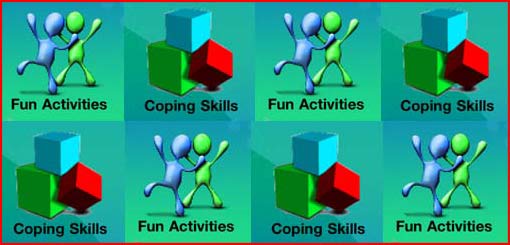
Sometimes a book title just grabs your attention. How about this one? The Taming of the Chew, by Denise Lamothe, who is a psychologist and speaker as well as an author. The allusion is, of course, to the Shakespeare play The Taming of the Shrew, which was later made into a movie called Kiss Me, Kate, starring Elizabeth Taylor and Richard Burton. Actually, Childhood Obesity News is not familiar with Dr. Lamothe’s book, but its charming title was the deciding factor in checking out the website, which proved to be rewarding.
As Dr. Pretlow has often discussed, food addiction can develop when a child tries to fill an empty emotional hole. Remember the old joke, “How many psychiatrists does it take to change a light bulb?” “Only one, but the light bulb has to really want to change.”
Unfortunately, for comfort eaters, stress eaters (PDF), and binge eaters, wanting to change is not enough. Wanting to change is a necessary condition, but not a sufficient condition. The person also needs to be equipped with a set of tools. Dr. Pretlow says:
Self-esteem and coping skills augmentation, along with stress management techniques, peer/mentor support, and motivational tools are the necessary skills needed for recovery from food addiction and resulting obesity in children.
What children (and adults) need are specific ways to deal with the stresses of life, most of which affect us emotionally in some direct or indirect way. When emotional eating is a problem, a person has to find other ways to satisfy emotional needs. Which is just what Dr. Lamothe offers in a piece called “One Way to Avoid a Binge.”
First, it’s important, psychologically, to keep the options open in your mind. The moment a person says “No” to herself or himself, a bunch of contrary notions come leaping and springing into the consciousness, trying to turn the “No” into a “Yes.” So the recommendation here is to stay neutral, and concentrate instead on finding a substitute activity, bearing in mind that you can always open that bag of chips later… just not right now.
What to do instead? When you’re feeling strong and whole, make a list of possibilities and keep it in an accessible place.
Why is it important to have a list? Because when the desire for food overcomes a person, it’s like other desires — the thinking part of the brain gets kind of fogged over, and ceases to function properly. Only the wanting part is operating then, and it’s not adequate to the job of thinking up a diversionary activity. That is too much to ask of the one-track mind, stuck in “I want I want I want.” But — even a brain in such a scrambled condition is still capable of choosing one activity from a previously-prepared list. So be ready.
When the urge for a binge strikes, you don’t have to commit to not eating chips. All you have to commit to is an activity from the list, leaving the chips decision open-ended.
The basic starter list suggested by Lamothe is a good one. She says:
Think about things you really enjoy and make your personal list of activities to grab when the urges threaten to overwhelm you… Choose one activity that you enjoy and do it. ([Y]ou may have to force yourself to begin as the compulsion to binge is overwhelming at times.) Often the urges to eat are long gone by the time you are through with your diverting activity and you can go about your day feeling peaceful and happy with yourself for bypassing a binge.
Now, about that list of possible diversionary activities. It has been provided for in the design of the “W8 Loss 2 Go” iPhone app. Your roster of attractive possibilities is right there in the phone, and here is what Dr. Pretlow learned in the earliest trials:
Participants were able to take the app wherever they went, thus it was available ‘in the moment’ for impending binges or overwhelming cravings. As today‘s youth typically are seen using cell phones, participants were not self-conscious about using the app.
So, the diversion strategy works. But maybe not 100% of the time. What if things don’t go so well? What if a person tries an alternative activity, or two, or even goes through the whole list and does them all, and still ends up wrapped around a gallon of ice cream? Back to Dr. Lamothe:
If you do, please don’t beat yourself up after. Remind yourself that there are no mistakes, only lessons and then treat yourself with love. That is what really helps.
Your responses and feedback are welcome!
Source: “An iPhone App Intervention for Childhood Obesity, Based on the Substance Dependence (Addiction) Model” (PDF), Weigh2Rock.com
Source: “One Way to Avoid a Binge,” DrDenise.org, 03/14/12

 FAQs and Media Requests:
FAQs and Media Requests: 











